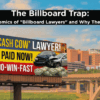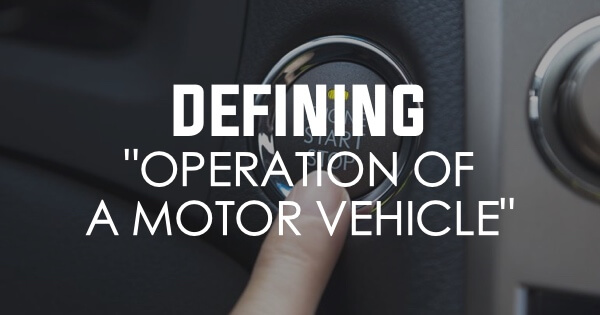
What does it mean to “Operate” a vehicle under Texas’ DWI laws?
 The simple answer is that it means whatever the jury (not the judge) says it means.
The simple answer is that it means whatever the jury (not the judge) says it means.
Under Section 49.04(a) of the Texas Penal Code, a person commits the offense of DWI when the person “is intoxicated while operating a motor vehicle in a public place.” Emphasis added. The Penal Code, however, does not define the term “operating.” When words are left undefined by statute, the Texas Government Code Section 311.011 tells us that those words are to be “construed according to the rules of grammar and common usage,” unless the word or phrase has some “technical or particular meaning,” in which case, the word or phrase “shall be construed accordingly.” What about the word “operating?” Is it common or technical?
In the trial of Kirsch v. State out in the Longview area, the defendant was charged with DWI after the police found him drunk while standing over his motorcycle trying to kick-start it on a public road. As you might guess, there was a dispute over whether he was “operating” his vehicle while intoxicated. Over defense objection, the trial court included the prosecutor’s requested definition of “operate” in the jury instructions:
to exert personal effort to cause the vehicle to function.
To the prosecutor’s credit, the definition was taken from an appellate case (although not one dealing with jury instructions). Now, under this definition it is pretty clear that by trying to kick-start the motorcycle, the defendant was indeed operating a motor vehicle. But if the term “operate” had been left undefined for the jury, then the defense could have certainly argued under the rules of grammar and common usage that the defendant was not “operating” his vehicle, because it was not running (or whatever other arguments an able defense counsel might make). Armed with a black and white definition of “operate,” the jury convicted the defendant of DWI.
The 6th District Court of Appeals (Texarkana) affirmed the conviction.
The Texas Court of Criminal Appeals reversed. For a unanimous court, Judge Alcala wrote:
Our cases have consistently held that “operate” is a common term that has not acquired a technical meaning and may be interpreted according to its common usage… Although an appellate court may articulate a definition of a statutorily undefined, common term in assessing the sufficiency of the evidence on appellate review, a trial court’s inclusion of that definition in a jury charge may constitute an improper comment on the weight of the evidence.
The opinion goes on to note that by instructing the jurors on the definition of the term “operate,” the trial court “impermissibly guided their understanding of the term.” “The jury should have been free,” the CCA held, “to assign that term ‘any meaning which is acceptable in common parlance.’” The CCA reversed the case and remanded it back to the COA for a harm analysis.
There you have it. The meaning of the term “operating” in the Texas DWI statute means…whatever the jury thinks it means.
Fort Worth DWI Defense Attorneys | Keller DWI | Grapevine DWI
Contact the top-rated Tarrant County DWI attorneys of Barnett Howard & Williams PLLC for a FREE consultation of your DWI case. We will help you determine whether the State could prove that you were operating a motor vehicle under Texas DWI law. Call (817) 993-9249 or send us a contact email from our website. Our team of DWI attorneys will get to work defending your rights and protecting your future.


 In January of this year, the Supreme Court of Texas heard arguments for
In January of this year, the Supreme Court of Texas heard arguments for 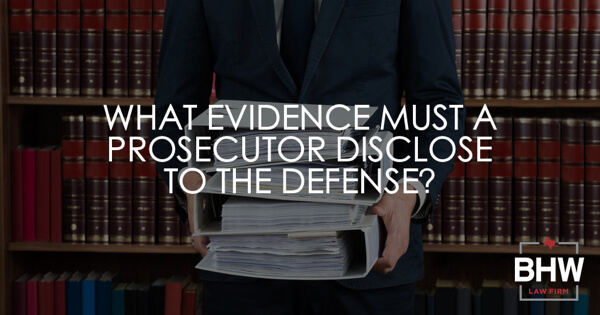
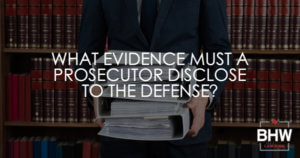 Prosecutors in Texas must disclose almost all of the evidence in their possession to the defense. Disclosure is the rule and not the exception in Texas.1 Section 39.14(a) of the Texas Code of Criminal Procedure requires the prosecution to disclose anything that “constitutes or contains evidence material to any matter involved in the action. . .”2
Prosecutors in Texas must disclose almost all of the evidence in their possession to the defense. Disclosure is the rule and not the exception in Texas.1 Section 39.14(a) of the Texas Code of Criminal Procedure requires the prosecution to disclose anything that “constitutes or contains evidence material to any matter involved in the action. . .”2
 One of the common factors in any DWI case is that there must be a motor vehicle involved. Every time. When someone who is under the influence of drugs and/or alcohol chooses to drive a motor vehicle, should the car itself be considered by Texas courts to be a “deadly weapon?” When do ordinary, daily objects, such as cars, become “deadly weapons” for the purpose of charging enhancements and raising the stakes in a criminal case?
One of the common factors in any DWI case is that there must be a motor vehicle involved. Every time. When someone who is under the influence of drugs and/or alcohol chooses to drive a motor vehicle, should the car itself be considered by Texas courts to be a “deadly weapon?” When do ordinary, daily objects, such as cars, become “deadly weapons” for the purpose of charging enhancements and raising the stakes in a criminal case?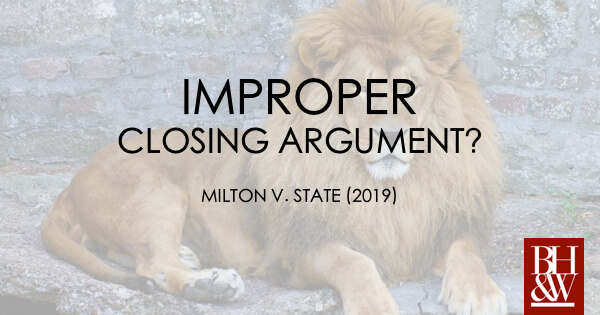
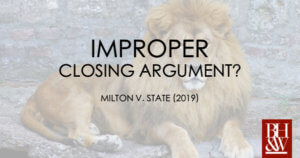 What do Atticus Finch, Lt. Daniel Kaffee, and Jake Brigance have in common? Each of these fictional movie attorneys are known for zealously representing their clients by delivering intense cross examinations and galvanizing closing arguments. Finch, defending a wrongly-accused man in a time a place where justice was compromised by racial bias, implored the jury to seek justice by tapping into a higher power, “In the name of God do your duty.” Stuck at the crossroads of respecting formal rank and seeking justice in a military court-martial, Lt. Kaffee made the choice to double down on Col. Jessep during cross examination, poking at the Colonel’s pride. Col. Jessep took Lt. Kaffee’s bait, screaming, “You can’t handle the truth!” Jake Brigance took a more creative approach. Asking jurors to close their eyes, Brigance described a depraved series of events that caused his client to murder two people. The jury agreed with the justification, and acquitted Brigance’s client.
What do Atticus Finch, Lt. Daniel Kaffee, and Jake Brigance have in common? Each of these fictional movie attorneys are known for zealously representing their clients by delivering intense cross examinations and galvanizing closing arguments. Finch, defending a wrongly-accused man in a time a place where justice was compromised by racial bias, implored the jury to seek justice by tapping into a higher power, “In the name of God do your duty.” Stuck at the crossroads of respecting formal rank and seeking justice in a military court-martial, Lt. Kaffee made the choice to double down on Col. Jessep during cross examination, poking at the Colonel’s pride. Col. Jessep took Lt. Kaffee’s bait, screaming, “You can’t handle the truth!” Jake Brigance took a more creative approach. Asking jurors to close their eyes, Brigance described a depraved series of events that caused his client to murder two people. The jury agreed with the justification, and acquitted Brigance’s client.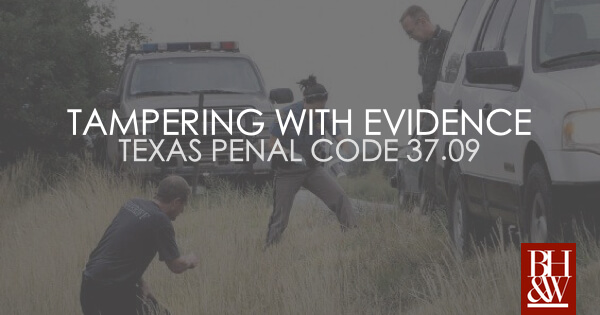
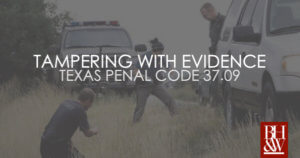 During routine traffic stops, police officers sometimes end up arresting individuals for the third-degree felony offense of Tampering with Evidence. How does this happen you ask? If, during the course of a traffic stop, an officer observes the driver toss an item or two out of the window, and those tossed items are later determined to be drugs and/or drug paraphernalia, the officer might just arrest the person for tampering with evidence pursuant to
During routine traffic stops, police officers sometimes end up arresting individuals for the third-degree felony offense of Tampering with Evidence. How does this happen you ask? If, during the course of a traffic stop, an officer observes the driver toss an item or two out of the window, and those tossed items are later determined to be drugs and/or drug paraphernalia, the officer might just arrest the person for tampering with evidence pursuant to 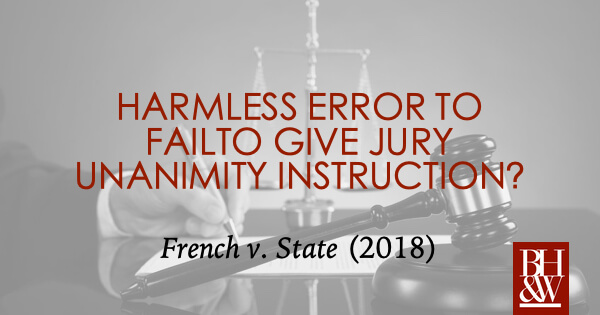
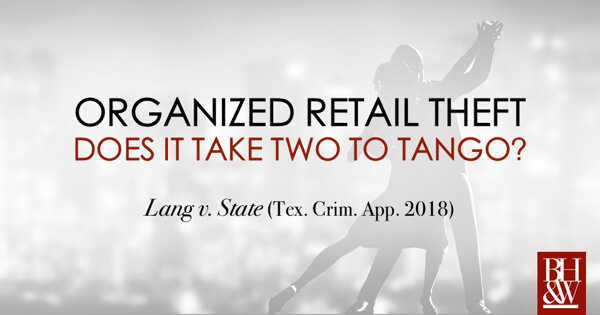
 The Court of Criminal Appeals recently handed down an opinion on the applicability of Texas’ organized retail theft statute. The issue facing the court was whether the statute defining the offense of organized retail theft permits a conviction for ordinary shoplifting by a single actor rather than requiring a group or collaborative effort.
The Court of Criminal Appeals recently handed down an opinion on the applicability of Texas’ organized retail theft statute. The issue facing the court was whether the statute defining the offense of organized retail theft permits a conviction for ordinary shoplifting by a single actor rather than requiring a group or collaborative effort.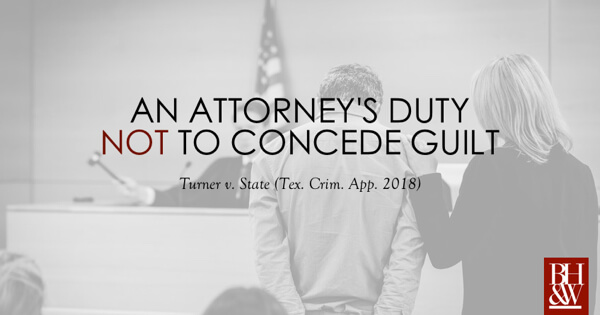
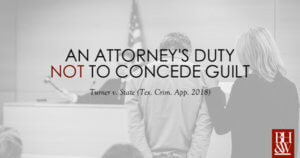 The Court of Criminal Appeals recently handed down an opinion regarding an attorney’s obligation not to concede their client’s guilt. The issue before the Court was whether the defendant was entitled to a new trial on direct appeal because his defense counsel conceded his guilt at trial against his wishes.
The Court of Criminal Appeals recently handed down an opinion regarding an attorney’s obligation not to concede their client’s guilt. The issue before the Court was whether the defendant was entitled to a new trial on direct appeal because his defense counsel conceded his guilt at trial against his wishes.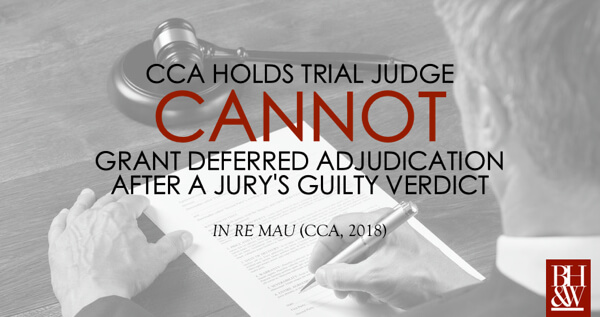
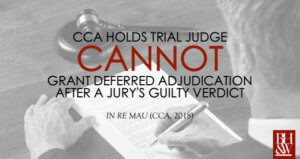 The Court of Criminal Appeals recently handed down an opinion on a petition for writ of mandamus. The two issues facing the court were (1) the nature of a misdemeanor trial after a defendant pleads guilty to a jury; and, (2) whether a trial court has the ability to defer an adjudication of guilt after a jury finds a defendant guilty. The Court of Criminal Appeals declined to grant mandamus relief on the first issue but, for the reasons discussed below, it granted mandamus relief for the second issue.
The Court of Criminal Appeals recently handed down an opinion on a petition for writ of mandamus. The two issues facing the court were (1) the nature of a misdemeanor trial after a defendant pleads guilty to a jury; and, (2) whether a trial court has the ability to defer an adjudication of guilt after a jury finds a defendant guilty. The Court of Criminal Appeals declined to grant mandamus relief on the first issue but, for the reasons discussed below, it granted mandamus relief for the second issue.
